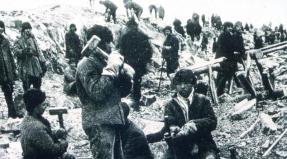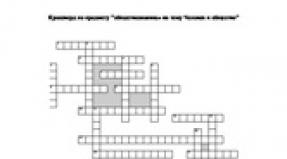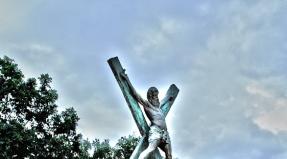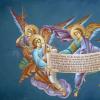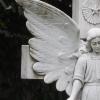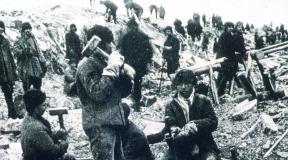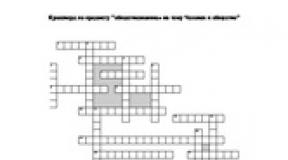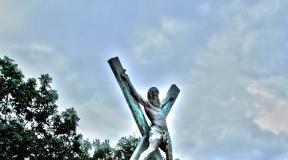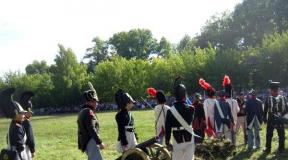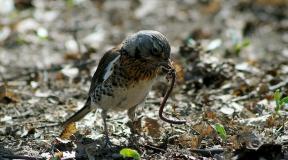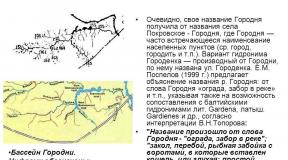Essay on the theme of Tendryaks. "Bread for the dog." The difficult process of awakening conscience (V. Tendryakov “Bread for the Dog”) Problems of the story Bread for the Dog
“Behind the door of a happy person there should be someone with a knocker,
constantly knock and remind that there are unfortunate people”
A.P. Chekhov.
The story “Bread for the Dog” is based on the childhood events of Vladimir Tendryakov. This is the era of post-revolutionary Russia and Stalinist repressions.
The problems of the story include consideration of the following issues: hunger as a moral problem, inhumane treatment of exiles, the mental torment of the main character and, of course, the author pays great attention to a person’s conscience.
The author clearly and impartially describes the events that take place in a small village near the station. Dispossessed “wealthy” peasants who did not reach their place of exile were exiled to this small Siberian village. They were left to starve to death in front of the village residents. “For the most part these are dispossessed men from near Tula, Voronezh, Kursk, Orel, from all over Ukraine. Together with them, the southern word “kurkul” also arrived in our northern places.”
Adults tried to avoid this terrible haven of people abandoned to the mercy of fate. The children watched with curiosity and hidden horror the suffering of these emaciated people. “We boys didn’t go into the park itself either, but watched from behind the fence. No horrors could stifle our animal curiosity. Petrified from fear, disgust, exhausted from hidden panic pity, we watched the bark beetles, the outbreaks of “rebels” ending in wheezing, foam, and sliding down the trunk.”
Vladimir Tendryakov resorts to an antithesis in his work, which enhances the impression of what is happening. He describes the terrifying scene of the death of the “kurkul”, who “rose up to his full height, grabbed the smooth strong trunk of a birch tree with brittle, radiant hands, pressed his angular cheek against it, opened his mouth, spaciously black, dazzlingly toothed, was probably going to shout (a) curse, but a wheeze came out, foam bubbled. Peeling off the skin on his bony cheek, the “rebel” slid down the trunk and () fell silent for good.” In this passage we see the contrast between brittle, radiant hands and a smooth, strong birch trunk.
In the mouth of the station chief, who kept order, the author puts a question that carries a philosophical meaning: “What will grow out of such children? They admire death. What kind of world will live after us? What kind of world is this? "
Tendryakov in this work appears before us as a master of the short story. The character of his hero is clarified through an emergency and tragic life events. The author is interested in a person in everyday circumstances at a sharp turn, a turning point in his fate.
Tendryakov tells how an impressionable boy watches the devastating picture of hunger and forces “tidy” people to be humiliated. “The milk spilled into the icy, unclean horse hoof print. The woman knelt down in front of him, as if in front of her daughter’s grave, gave a strangled sob and suddenly took a simple, chewed wooden spoon out of her pocket. She cried and scooped milk from a hoof hole on the road with a spoon, cried and ate, cried and ate, carefully, without greed, in a well-mannered manner.”
But the child’s soul did not harden. On the contrary, he tried to help people. He knew that being full was a shame, but still he secretly took out the remains of his food to the “kurkuls”. But, as they say, “you can’t warm everything up.” Every day more and more people gathered at the boy’s house; of course, there was not enough food for everyone. And the child has a nervous breakdown. “An alien, wild voice burst out of me at a sobbing gallop: “Wow!” Go away!! Bastards! You bastards! Bloodsuckers!! Go away! Throughout the story, the author shows the inner experiences of his hero. This can be seen in his thoughts and conversations with his father. Tendryakov emotionally describes in simple words the child’s fear and protest. It is thanks to the simplicity and surprisingly precise choice of words that the pictures that Vladimir Tendryakov talks about emerge with extraordinary clarity in the reader’s imagination.
The boy did not sleep at night, he thought: “I’m a bad boy, I can’t help myself - I feel sorry for my enemies!” The child was constantly tormented by his conscience and did not allow him to live in peace.
And then a dog appears in the story. “Suddenly, below, under the porch, a dog seemed to grow out of the ground.” She had deserted, dull, unwashed yellow eyes and abnormally disheveled fur on the sides and back in gray tufts.” She turned out to be the hungriest creature in the village. The boy sees his salvation in this dog. Volodya feeds this unfortunate dog, which does not exist for anyone, but understands that “I did not feed a dog that was peeling from hunger with pieces of bread, but my conscience. I won’t say that my conscience really liked this suspicious food. My conscience continued to be inflamed, but not so much, not life-threatening.”
The story ends tragically. “That month, the station manager, who, as part of his duty, had to wear a red hat along the station square, shot himself. He didn’t think of finding an unfortunate little dog for himself to feed every day, tearing the bread away from himself.”
Vladimir Tendryakov managed not only to convey his childhood memories, but also to awaken compassion and empathy in the hearts of his readers. V. Tendryakov’s terrible story “Bread for the Dog” shows the gap between the cold world of ideas and true, living human participation. Humanity can only manifest itself in compassion, empathy, empathy for a specific living person.
Tendryakov presents the reader with a choice: to live according to moral laws, according to conscience, with compassion and empathy, or to care only about one’s well-being.
In the article “The Flesh of Art,” Tendryakov wrote: “We are all people living in one world, one life, and it is impossible for your grief to cause me joy, and the reasons for my delight to be hateful to you. Feel my grief as if it were your own, if you don’t want us to poison each other’s existence! This should be the goal not only of art, but of any society.”
Tendryakov's stories do not leave the reader indifferent, and such works are needed. The author wants to convey to us the idea that every person needs to be responsible for their actions, to be attentive towards any living being, responsible to people and to themselves, to their conscience.
Malikova Lyudmila Anatolyevna, teacher of Russian language and literature, MAOU Secondary School No. 54, Tomsk
Lesson topic "...nothing can us
In the midst of worldly sorrows, to calm;
Nothing, nothing...one
Is it conscience?
Lesson objectives:formation of communicative and sociocultural competences through comprehension and analysis of literary text.
Tasks: 1) improve skills in analyzing literary texts;
2) form a civic position through understanding the historical past of the country and fundamental moral concepts;
3) through the organization of group work, develop the communication abilities of students.
During the classes:
| Org moment. Teacher's word: cluster Update A word about the writer Vladimir Fedorovich Tendryakov (message from the student “The Writer and His Time”) Teacher's word Group work Group responses. Teacher's word Homework | As the theme of this lesson, I offer you the words of our wonderful poet A.S. Pushkin from the tragedy “Boris Godunov”. Write down the topic of the lesson, get ready to read this statement and explain how you understand its meaning? (study answers) Is the meaning of this statement immediately revealed? Why? (complex phrase, outdated words) Which words or words did not cause any difficulty? (Most likely the word “conscience”. Why?). Give its interpretation. And here is the definition of this word given by the explanatory dictionary (slide). (conscience- a sense of moral responsibility for one’s behavior before other people and society. People with a clear conscience. Remorse. Live according to your conscience.) Very often we hear and use the expression “live according to conscience”, what does this mean? (answers from students in the cluster) Why do you think I started our lesson this way? (from a conversation about conscience). CHILDREN THEMSELVES CAN BRING TO THIS CONNECTION... At home you read V. Tendryakov’s story “Bread for the Dog.” How can we relate the content of this story to the topic of our lesson? (study answers) Then what are the goals and objectives of our lesson? (setting goals and objectives) Are you familiar with this writer and his works? Then I offer you a short excursion into the biography of this person (learning message and presentation). We have just heard that the fundamental concept in a writer’s code of ethics is conscience. This is evident even from the titles of his works: “Reckoning”, “Spring Changelings”, “Bread for the Dog”. You read the story “Bread for the Dog” at home. What is this story about? How will you define its theme? (The slides give options: “Hungry 1933”, “Inhumane treatment of exiles”, “Torment of human conscience”, “Depiction of a certain era in the life of our state”.) Give reasons for your choice. (study answers) Of course, all these themes are conceptualized in one way or another in this work, but we will still try to highlight the main one, without which the story would lose its “core.” To do this, you will now work in groups. Each group has its own task. We have a group of historians, literary scholars, linguists, and psychologists. On your desks you have a handout “How to work in a group.” Before starting work, do not forget to familiarize yourself with it. Remember that your work will be assessed both within the group and by each group. Think about who from the group will answer; the rest can complement the comrade. (Presentation of the results of work in groups. At this time, students from other groups can ask each group clarifying questions to help evaluate the quality of their work) The life of every person is inextricably linked with the life of his country. Therefore, we are the first to invite expert historians who will help us plunge into this era. We have decided on the historical era. What demonstrated the skill of the writer who managed not to leave his readers indifferent? Literary experts will talk about this. Not only his imaginative thinking, but also his reverent attitude towards word. We invite linguistic experts with their observations. Today we are working with a difficult concept - “conscience”. And here we need the help of experts Psychologists who will help you understand the nature of human actions. (Don’t forget to evaluate the groups’ work) We have listened to all the experts and now we will return to the topics that were discussed at the beginning of the lesson. Can you now identify the core one? (Torments of human conscience). Whose work in the group made you change your mind? What influenced your opinion? In the 6th grade, we read Nikolai Petrovich Wagner’s fairy tale “Gingerbread Father.” The author uses an interesting metaphor for the visual perception of conscience. Maybe someone remembers which one? (if not, then remind: “Every person, small and big, has a pretty tiny girl in a white dress sitting in her heart. But this dress is not always clean. If someone does a good, good deed, then the little girl starts jump for joy and quietly sing funny songs. But if a person does something bad, then the little girl will cry bitterly. And how can she not cry when every bad deed causes a black spot to appear on her white dress, as if on him splashed with mud. Who enjoys wearing a dress with stains?"). Today can you explain why this author came up with this particular metaphor? What metaphor would you come up with? At home, using the cluster you created, draw what kind of conscience do you imagine? Give your description in writing. Maybe someone will write instructions on how to use it. And the second task: find and write down phraseological units with the word “conscience”. |
Materials for the lesson
"How to work in a group."
Be respectful and kind to everyone in the group. Listen to everyone. Speak to the point.
Read carefully and listen to the task. Make sure everyone understands everything in it.
Discuss the question in the group. Formulate your answer accurately, competently and beautifully.
Write down each answer in your own draft.
If necessary, seek clarification from a senior student or dictionary.
Inspiration, patience, good luck.
Group assignments
(Groups perform in the order in which the tasks are written)
Experts - historians
What do you know about this era from the text of the work?
Look at the illustrations on page 115 in the textbook (“Physical Parade” and “Children Dying from Starvation”). For what purpose are these photographs placed on one page? How do you feel about them?
What episodes do you consider significant for creating the look of the era?
Why does V.F. Tendryakov raise this topic in his work? What is its significance? Are such works needed in literature?
Experts - literary scholars
The story begins with a terrible description of the exiles, the “kurkuls”. Find their description, what literary device does the author use for this description and why?
Follow the text to what detail of the portrait does the author pay attention to when creating images of his characters? What epithets does he use? How do you understand them? What are they used for? ?
Refer to the ending of this story. How do you understand the expression “I didn’t feed a mangy dog with pieces of bread, but my conscience”? What is the name of the artistic technique used by the author? What is his role?
Reference material
Metaphor- a type of trope, a hidden figurative comparison, likening one object or phenomenon to another (for example: a fire of red rowan).
Epithet- figurative, artistic definition.
Antithesis- opposition, opposite.
Oxymoron- a stylistic turn in which semantically contrasting words are combined to create an unexpected semantic unity, for example: living corpse, wretched luxury.
(Remember the expression “The eyes are the mirror of the soul.”)
He (kurkul) fell out from among the people. (p.104)
The station manager was wandering along the platform on duty in a brand new uniform cap with a flashy red top. He looked at his feet and was silent.(page 105)
I stealthily he didn't finish his meal what my mother put in front of me. I stolenly uploaded into my pockets the honestly saved three pieces of bread... In broad daylight I went out to thieves' business- on secret hunt for himself, the hungriest. (Think why a good deed is “done” by thieves?) pp. 108-109
Out of frustration—and also out of hunger—I ate the bread without moving. He was unexpectedly very tasty and... poisonous.
How did you understand the meaning of the expression “your heart is calloused”? Which of the heroes can this be said about?
What is the role of the proverb “You can’t scoop up the sea with a teaspoon” in this work? (Who says it, with what intonation, what does the hero feel?)
Experts - psychologists
Re-read the passage on page 108 (slide with text on the board). Can it be called a dialogue? Who are its participants? Why did the author include this fragment in the work? How does it relate to the section we are studying?
Different qualities can manifest themselves differently in different people. Draw on a straight line (on an A3 sheet) how such a quality as conscience, among the heroes of V.F. Tendryakov (from the least manifestation of this quality to the greatest manifestation). Where on this straight line will the main character Volodya Tenkov, his father, the station chief, Volodya’s brother, policeman Vanya Dushnoy, and the woman nicknamed Belch be located? Justify your opinion.
What meaning does the author put into the phrase (p. 115): “I didn’t feed a mangy dog with pieces of bread, but my conscience. I won’t say that my conscience really liked this suspicious food. My conscience continued to be inflamed, but not so much, not life-threatening”?
What is your generalization of what “conscience” is and what role did V. Tendryakov’s story play in our understanding of it?
Vladimir Fedorovich Tendryakov
Born into the family of a rural servant. The morning after the school prom he went to the front. He did not have to fight for long, but during the most difficult time of the war. In 1943 he was seriously wounded and demobilized.
This is how “life in civilian life” began. Vladimir Fedorovich went to teach military science at school. Then he began working as secretary of the Komsomol organization.
After the war, Tendryakov began working as a journalist - a correspondent for the magazine Ogonyok. He wrote essays about the village. Collections of prose devoted to social and ethical issues were published annually. At the center of his prose is a person who, through his own fault or due to tragic circumstances, is torn from the normal course of life.
The main themes of the writer’s work are rural life in the 40s and 50s, school and adolescence, human spirituality. The fundamental concept in his ethical code is conscience. In the story “Three Bags of Weedy Wheat” he clearly expresses the most important ideological motive for Tendryakov: there is no such good, such a “high” goal for the sake of which it would be worth neglecting a specific individual.
The works of V.F. Tendryakov almost always caused heated controversy. He posed questions to readers in which the country's economy, its ideology and morality were interconnected. The writer does not offer clear answers. Many of his things today sound extremely topical.
“The difficult process of awakening conscience” (V.F. Tendryakov “Bread for the Dog”) We analyze the meanings of the story We analyze the meanings of the story “Bread for the Dog” and analyze the process of awakening the conscience of the heroes of the story. Try to formulate the main theme of V.F.’s story. Tendryakova. Try to formulate the main theme of V.F.’s story. Tendryakova. If this is difficult, choose from the proposed formulations the one that seems most accurate to you: “The hungry year of 1933”, “Inhumane treatment of exiles”, “Torments of human conscience”, “Depiction of a certain era in the life of our state”. The description, terrible in its tragic power, conveys the terrible impression that “those who were no longer considered human” made on those around them, in any case, on those of them who had not lost their conscience, or on those who were just emerging. The first included, for example, the station chief, the second included the little (ten-year-old) hero of the story, Volodya Tenkov. Such a sight helps to awaken the conscience, excites it (such as Vanya Dushnoy do not count). The main semantic load in this episode is carried by the following words and expressions: “at the smoke-smoked station building, painted with official ocher” (what is the meaning of the word “official”?); “behind the peeled fence”; “those who were no longer considered human”; “in the depths of dirty, lousy rags”; “dirty document”; “outwardly they did not look like people”; "skeletons"; "tightly swollen"; “gnawed the bark”; “smoldering, not human... eyes”; “exuding a sour stench from its half-decayed rags”; “someone spread out like jelly on the ground”; “someone was stuffing a station trash can from the ground into his mouth”; “Those who had already died were most like people.” The description, terrible in its tragic power, conveys the terrible impression that “those who were no longer considered human” made on those around them, in any case, on those of them who had not lost their conscience, or on those who were just emerging. The first included, for example, the station chief, the second included the little (ten-year-old) hero of the story, Volodya Tenkov. Such a sight helps to awaken the conscience, excites it (such as Vanya Dushnoy do not count). The main semantic load in this episode is carried by the following words and expressions: “at the smoke-smoked station building, painted with official ocher” (what is the meaning of the word “official”?); “behind the peeled fence”; “those who were no longer considered human”; “in the depths of dirty, lousy rags”; “dirty document”; “outwardly they did not look like people”; "skeletons"; "tightly swollen"; “gnawed the bark”; “smoldering, not human... eyes”; “exuding a sour stench from its half-decayed rags”; “someone spread out like jelly on the ground”; “someone was stuffing a station trash can from the ground into his mouth”; “Those who had already died were most like people.” How the author explains that his hero (apparently himself as a child or someone very similar to him), “an impressionable, vulnerable boy,” “didn’t get sick, didn’t go crazy” after he first saw a man dying of hunger ? (Find in the text, read.) How the author explains that his hero (apparently himself in childhood or someone very similar to him), “an impressionable, vulnerable boy,” “didn’t get sick, didn’t go crazy” after that How did you first see a man dying of hunger? (Find in the text, read out.)
Why was Volodya more shocked than death by the episode with the spilled milk?
Did the fact that he was “well-fed” spoil Volodya? Why did their classmates react without gratitude to Volodya’s attempt to feed them? Did the fact that he was “well-fed” spoil Volodya? Why did their classmates react without gratitude to Volodya’s attempt to feed them? Why did Volodya suffer from remorse when he sat down at the table, and his brother ate calmly? How did Volodya try to help the hungry? Why did Volodya, with a shout, “an alien, wild voice,” drive hungry people away from the house? Why did Volodya, with a shout, “an alien, wild voice,” drive hungry people away from the house? What struck Volodya most about his father’s words about the dog and about the dog itself? How do you understand the meaning of the phrase: “I didn’t feed a shabby dog with pieces of bread, but my conscience”? Volodya Tenkov, hero of the story by V.F. Tendryakova, enters the age when the inner “I” awakens, the voice of conscience. His brother hasn’t grown up to this yet. Volodya condescendingly notes: “My brother was three years younger, at seven years old he knew how to worry only about himself...” In Volodya’s life, as in the lives of the heroes Herzen, L. Tolstoy, Gorky, events occurred that tore “the skin from his heart "
- Volodya Tenkov, hero of the story by V.F. Tendryakova, enters the age when the inner “I” awakens, the voice of conscience. His brother hasn’t grown up to this yet. Volodya condescendingly notes: “My brother was three years younger, at seven years old he knew how to worry only about himself...” In Volodya’s life, as in the lives of the heroes Herzen, L. Tolstoy, Gorky, events occurred that tore “the skin from his heart "
- The terrible sight of the hungry suffering, the starvation death of the exiles did not drive him crazy, because he saw an even more painful picture: a decent, well-mannered, neatly dressed woman scoops milk from a dirty horse track with a “gnawed wooden spoon” and eats it, crying, kneeling down, “like in front of my daughter’s grave.”
- A real paradox: people steal for themselves, Volodya “thievishly” does not finish eating what his mother gave him, “thievishly” hides bread in his pocket and goes out “on a thieves’ business” - “on a secret hunt for the very, very hungry.”
- Why does a boy who has started a good deed shout so terribly at those whom he wanted to feed? Not only from fear, but also, I think, from the consciousness of his absolute powerlessness. Unfortunately, my father’s bitter phrase (“You can’t scoop up the sea with a teaspoon”) also turned out to be true.
- But Volodya still could not remain indifferent. What to do? How to “feed” your hungry, unsatisfied conscience? Finally, the “very, very hungry” one that Volodya had been looking for for so long was found - an unfortunate, shabby dog that even Volodya’s father did not feel sorry for (he felt sorry for its owner), a dog that had forever lost trust in humans. She has “empty, inaccessible eyes” without any expression, even without fear. Yes, Volodya probably saved the dog from starvation, but she also saved him morally: she gave him the opportunity to take care of someone, to calm, as far as possible, the torment of his conscience, to do the good that he, a boy, could do . By feeding the dog, he “fed” his conscience.
- Watching the curious, albeit frightened boys, the station chief once “said either to us, or to himself, or to the generally indifferent sky”: “What will grow out of such children? They admire death. What kind of world will live after us? What kind of world is this?..” This man shot himself from remorse, from his own powerlessness, not having thought of finding himself a “poor little dog” that he could feed, tearing bread from himself. We dare to note that it is unlikely that even a little dog would have helped: before us is not a child, but an adult, serious person experiencing a deep internal tragedy.
- Volodya’s father is experiencing a similar, if not stronger, spiritual drama.
- What artistic details speak about the father’s mental anguish, about his internal discord?
- Why at the end of the story does Volodya’s father look like the station master? (See the phrase by V.F. Tendryakov: “Lately my father had a kind of dark face, red eyelids, in some way he reminded me of the station master, walking along the station square in a red hat.”)
- We answer the main question of the lesson: why weren’t people considered human?
- Not considering people as people is a favorite technique of extremist sects and totalitarian regimes, part of whose efforts are aimed at finding and destroying internal and external enemies. This is the easiest way to turn off what, in principle, exists in every person - conscience. Conscience is exactly what awakens in the main character; something that makes him try again and again to help those who feel bad. But “you can’t scoop up the sea with a spoon,” and the child, after unsuccessful attempts to feed the dying of hunger and the simply hungry, saves a dying dog. And this saves himself. Because preserving your conscience is the only way to remain human yourself.
- Read chapters from the story by V.G. Korolenko “The Blind Musician” (textbook, pp. 119–147).
“Human” and “subhuman”... Where is the line between them? What is she like? Where does it take place? The issues are controversial and complex. One thing can be said - the line is thin, very thin, and everyone has their own. It is enough for one to experience envy, jealousy, and he loses his human image, for another - fear, hunger, poverty, or, conversely, to plunge into luxury, for a third - an animal grin from birth. There are many tests. Hence the great variety of destinies. Some cannot stand it, give up and die, physically or spiritually - there is no difference, moreover, the death of the “soul” is much more terrible. Others also seem to cave in, but tirelessly continue to search for the saving straw, and find it, because it cannot but exist... Tendryakov’s story “Bread for the Dog” is precisely about this thinnest line...
Hungry post-revolutionary Russia
Post-revolutionary Russia. What words can you use to describe it? What colors can be used to depict the hunger and horror that reigned everywhere? Only black ones! But black without white makes no sense, just like white without black. Therefore, Vladimir Tendryakov in his work “Bread for the Dog” (a brief summary follows), of course, along with dark tones, uses all shades of light. There are not as many of them as we would like, but they exist, which means there is hope, love, and justice...
“Bread for the Dog”: a summary of the work by V. Tendryakov
The year was 1933. Summer. Small Russian town. Smoke-stained station building. Not far from it is a peeling fence, behind it is a through birch garden, and in it, on the dusty grass, are those who have not been considered human for a long time. In fact, they had documents, worn out, but identifying them: last name, first name, patronymic, year of birth, for what he was convicted and where he was sent... But this no longer bothered anyone, just like what they eat, drink, where they live, who they work for. They are dispossessed men, dispossessed people, enemies of the people, or, as they were called, “kurkuls,” which means they have fallen out of the ranks of the people.

However, they did not look and behave like people either. Exhausted by hunger and disease, some seemed like dark-skinned skeletons with huge empty eyes, others looked like “elephants” bloated from dropsy with skin bluish from tension. Some gnawed the bark of trees or ate garbage from the ground, others lay in the dust, moaning, staring blankly at the sky. But most of all, those who had already left the world of the living resembled people. They lay calmly, peacefully. However, there were “rebels” among them. When they took their farewell sigh, they were overcome by real madness - they stood up, tried to shout out murderous poisonous curses, but only wheezing came out, foam bubbled, and they fell silent, forever... The story “Bread for the Dog” does not end with this episode.
The main character of the story
Adults tried to avoid this gloomy place. The kids didn’t come in either, they were afraid, but some kind of “animal” curiosity took over, and they climbed onto the fence and watched what was happening from there. They were choked by fear, disgust, they were exhausted from hidden, and therefore unbearably acute, piercing pity, but they continued to look with all their eyes. “What will grow out of such children? They admire death...” said the station chief, wandering along the platform on duty.

Among those children was a ten-year-old boy, Volodka Tenkov, the main character of the story “Bread for the Dog.” Analyzing the work will help you better understand the theme, idea and problems of the work. The story unfolds as a series of memories, therefore, the narration is told in the first person - on behalf of this boy. As an adult, he was surprised for quite a long time and could not understand how he, as a child, vulnerable, impressionable, with a fragile psyche, did not get sick from the darkness and horror. But then he recalls that by that time his soul was already “calloused.” Sooner or later a person gets used to everything and comes to terms with it. So his soul was accustomed to seeing pain, suffering, public humiliation of “tidy” people from hunger alone. However, are you used to it? No, rather, it has developed its own “protective layer”. She suffered and suffered endlessly, but continued to breathe deeply, empathize and look for saving ways out of hopelessness.
It's a shame to be full
At first, Volodka tried to honestly share his breakfast - four pieces of bread - with his classmates. But there were too many willing and “suffering” people - hands reached out from all sides. The bread fell, and several feet, out of impatience, without any malicious intent, walked over the pieces and crushed them...

Volodka was tormented, but at the same time did not let him go crazy by one more thought: those who died in the birch garden were enemies. What do they do with enemies? They are destroyed, there is no other way, because a defeated enemy is still an enemy: he will never forgive and will definitely sharpen the knife behind his back. On the other hand, can one who gnaws the bark of a birch forest be considered an enemy? Or are the enemies those old people and children who died of hunger in dispossessed villages? He found his answer to these questions: he cannot “absorb” his “dishes” alone, sharing with someone is simply necessary, even if he or she is an enemy... “Bread for the Dog,” a summary of which is given in This article is a story about which are terrible, but without which one dies.
Who's the hungriest?
He secretly did not finish eating what was served to him for lunch or dinner, and honestly took the “thieves’” food saved to the one who was, in his opinion, the hungriest. It was both easy and difficult to find such a person. Everyone in the village was hungry, but who was the most hungry? How to find out? You can't go wrong...

He gave his “pocket-burning” remains of lunch to one “uncle” with a pale, swollen face, and decided to do this every day. He succeeded in making one person “happy,” but over time the number of beggars began to grow inexorably. Every day a great multitude of them gathered near his house. They stood all day and tirelessly waited for his exit. What to do? There is not enough strength to feed more than two. But my father said that it was impossible to scoop up the sea with a teaspoon... And then he had a breakdown, or, as he himself said, a “cure.” In an instant, his vision darkened, and from somewhere in the depths of his soul, sobs beyond his control and a cry burst out: “Go away! Go away! You bastards! Bastards! Bloodsuckers! And they silently turned around and left. Forever.
V. Tendryakov: “Bread for the dog”, or “Food for the conscience”
Yes, he was cured of boyish pity, but what to do with his conscience? It is impossible to get rid of it, otherwise it will be death. He is full, very full, one might say, to his fullest. Probably, these products would be enough for five people to save themselves from severe starvation. He didn't save them, he simply ate their lives. These thoughts prevented him from eating or sleeping. But one day a dog came up to their porch. She had empty, “unwashed” eyes... And suddenly Volodka was overcome with steam as if in a bath: here it is - the most hungry and unfortunate creature in the world! And he began to feed her: every day he brought her a piece of bread. She grabbed him on the fly, but never approached the boy. The most devoted creature on earth to man never once trusted him. But Volodya didn’t need this gratitude. He did not feed the skinned dog, but his conscience. It cannot be said that the “food” offered was so pleasing to the conscience. She “fell ill” from time to time, but without the threat of death. The story doesn't end there. V. Tendryakov (“Bread for the Dog”) included another episode, very small, but very effective, one might say, an emotional “total” from the author.
In that same month, the same station chief walking along the platform committed suicide. “Human” and “subhuman”: he crossed this fine line and could not stand it... How did he not think of finding some bald little dog for himself, so that he could tear something away from himself and share it every day? This is the truth!
Once again I would like to remind you that the article is dedicated to the story “Bread for the Dog” by V. Tendryakov. The summary cannot fully reflect the emotional anguish in the soul of the little boy, describe his fear and at the same time silent protest against the existing world order. Therefore, reading the work in its entirety is simply necessary.
Parents Father, F. Tendryakov, people's judge, then prosecutor Basic facts of the biography (before studying at the Literary Institute) After graduating from school, he went to the front, was wounded and demobilized; taught military science at school, then was secretary of the district committee of the Komsomol Education In 1945 he came to Moscow and entered the art department of VGIK. In 1946 he moved to the Literary Institute. M. Gorky, who graduated in 1951. During his student years, he begins to write stories, some of them are published in the magazines “Ogonyok”, “New World”, “Our Contemporary”
Profession Writer, prose writer, screenwriter Works Stories “The Fall of Ivan Chuprov” (1953), “Not in the Court” (1954), “Potholes” (1956), “Miraculous” (1958), “Three, Seven, Ace” (1960) , “Court” (1961), “Emergency” (1961), “Short Circuit” (1962), “Mayfly short century” (1965), “Nakhodka” (1965), “Death” (1968), “Apostolic Mission ", "Spring Changelings" (1973), "Three Bags of Weedy Wheat" (1973), "The Night After Graduation" (1974), "Eclipse" (1977), "Reckoning" (1979), "Sixty Candles" (1980) , "A Century's Journey" (1964); novels “A Tight Knot” (1956), “Behind the Running Day” (1959), “A Date with Nefertiti” (1964); plays, essays, stories in the book “The Flesh of Art” (1973)
Film scripts based on his own works “Alien Relatives” (1956) based on the story “Not at Court”; “Sasha Enters Life” (1957) based on the story “A Tight Knot”; "Miraculous" (1960); "The Trial" (1962); “Spring Changelings” (1975), prize at the All-Union Film Festival; “Everyday Business” (1977) based on the novel “Where are you, Lyubov Dunyashova?” Staged performances based on the works of V. Tendryakov “Three Bags of Weedy Wheat” (1975) Bolshoi Drama Theatre; “Without a Cross” (1963), based on the story “The Miracle Worker” Moscow Sovremennik Theater
The main problems of the works are the most pressing issues related to the life of the village; problems of double morality generated by the conformism of a person of both the older and younger generations; problems of education and upbringing, issues of restructuring the entire school education system, which, from the writer’s point of view, leveled the personality of a young man; understanding the tragic events in the history of the country

Conscience is “...the inner consciousness of good and evil...the ability to recognize the quality of an action; a feeling that encourages truth and goodness, rejecting lies and evil...” (Dal V.I. Explanatory Dictionary of the Living Great Russian Language) Conscience is the ability to realize that you have acted badly. Conscience is the quality of the soul of every person. Conscience dictates to a person actions that atone for his guilt. They say: conscience has spoken. This means that conscience is something living and active. Conscience is the highest personal judge of a person. And a person who has a conscience is a person who, even when no one sees him, will act exactly the same as if the whole world was looking at him. This is the ability not to compromise with oneself in choosing between good and evil, the ability to never do something contrary to oneself, although it would be much easier. Conscience is a human feeling that controls relationships between people. Conscience forces a person to look at his actions from the outside. This is an internal controller that helps a person make the right choice.
KeywordsGeneral conclusion about the author's worldview (author's position)... Conscience tends... to wake up in the body of well-fed people... The very burden of hunger forces... to selfishness. In both passages, the key word for the author is conscience. He argues that conscience is the most important part of a person’s inner world, and its absence, both in a well-fed and in a hungry person, puts a person on the brink of personality collapse, turning him into a creature whose center of existence becomes his own ego, the Latin word that gave the root to Russian egoism, which means, in particular, complete disregard for the life and interests of another person... I fed pieces of bread... my conscience... My conscience continued to become inflamed... but... not life-threatening

In the story “Bread for the Dog,” V. Tendryakov addresses the problem of conscience. The author solves this problem using real-life material: childhood memories of one of the most terrible periods in the history of Russia, the famine of 1933. Appeal to this form and to the 1st person of the narrative speaks of the author’s attempt to realize the degree of his guilt and responsibility for what happened. The title of the story has a metaphorical, figurative meaning, indicating that the background of the events that became the basis of the plot are the author’s thoughts about time and man and the moral law, the observance of which forms the essence and meaning of the personality of each of us. This law is conscience. For the hero of Tendryakov’s story, a ten-year-old boy Volodya Tenkov, conscience is a powerful incentive to action, that is, to choosing an action whose meaning would not burden him with the burden of his own guilt for what he had done.

For many years now, a person has been arguing with himself: is it time that is to blame for the fact that a person often goes against his conscience, or is it still the person himself who is to blame for this? Tendryakov gives an unambiguous answer to this question: under all mitigating circumstances, only a person is responsible for any of his actions, for only he alone has been granted knowledge about himself, the knowledge that we compare with the concept of “conscience.” Under any conditions, it encourages a conscientious person to think about the passage of time, to listen to the signals that it, time, gives to a person. Tendryakov introduces a certain system of symbolic designations of time into the structure of the narrative in order to immerse the reader not only in the historical, but also in the philosophical aspect of existence in order to help him understand his own “I”. (man’s search for his own “I” in the flow of time"
In a very difficult situation, which an adult station manager was unable to survive, the boy makes a choice not between a man and a dog, but between the possibility or impossibility of remaining a person who deserves at least a modicum of self-respect. This self-respect is the key to his possible, but most likely unattainable, happiness.
The problem of happiness Happiness is not external beauty, but inner peace, which gives the hero the “mysterious, ashen twilight” of the early morning; in these moments the boy does not think about what the coming day brings to him; his soul is serenely calm, the harmony of his unity with the world around him is not disturbed by a single rough sound or disturbing color, everything is simple and familiar for a long time: a tit, a starling, a cuckoo, their squeaking, singing “to the nightingale,” the cuckooing promise of a long life. Happiness is in the feeling of the fact of your own existence in this sweet, familiar world to the soul and heart; this is the harmony within yourself. The author claims that a child must live according to the laws of childhood, the main of which is the feeling of happiness just from the fact that you are alive. But real life is such that it turns out to be impossible to become happy in its conditions, to live in harmony with oneself and the world. The author shows this by building a composition that includes a description of a cozy morning in such a way that it is “inserted” into the frame of the terrible details of real life: a happy morning is preceded by the boy’s difficult thoughts about whether or not a “kurkul” dying of hunger can be considered an enemy, perhaps it is precisely these thoughts that keep the hero from sleeping: “...I suddenly woke up”; the other side of the “frame” is a description of the roar of a cart approaching the house, onto which the groom Abram will now load the bodies of the “kurkuls” who died overnight. There is no simplicity in life, there is no beauty, comfort, tranquility in it - all that the hero perceives as happiness.
Why does the author put thoughts about the cruel truth of life - the horror of violence and deception - into the mouth of a child? The author’s task is to show a growing soul, discovering the world for itself, looking for its place in it, its happy lot, and in this search going through such tests that not every adult can withstand. Tendryakov wants to show the formation of such a moral consciousness, the driving force of which in its “contact” with the world and oneself will be conscience, the only measure of inner peace, which for the writer is synonymous with happiness.
Telling the story of his childhood, from all the memories of him, the author chooses events that are tragic in nature, and this choice is not accidental; it is dictated to Tendryakov by the conscience of an adult who feels guilty and responsible for what happened. It seems, what can a ten-year-old boy do for those unfortunate people with whom his circumstances have confronted him? What are its capabilities in comparison with the capabilities of the state? But the hero does not ask himself, as the author admits, these “adult” questions. He obeys his first emotional impulse of pity and commits an act: he tries to feed the hungry. Is it necessary to do this because, as the father tells the boy, “you can’t scoop up the sea with a teaspoon”?

Analyze a selection of quotes from the text of V. Tendryakov’s story “Bread for the Dog.” Find keywords that convey the hero's feelings. What guilt does the hero take upon himself? How does this attitude towards himself characterize him? What is the author's position in the hero's dispute with himself?

Reflections of the hero 1) He lay in front of us... a flat skeleton in rags, a skull on brick chips, a skull keeping a human expression of humility, fatigue... thoughtfulness. He lay there, and we looked at him disapprovingly. He had two horses, bloodsucker! And yet I felt sorry for the evil enemy... I sat down at the table at home, reached out to the bread, and my memory unfolded pictures:... quietly stunned eyes, white teeth gnawing on the bark, a gelatinous carcass bubbling inside, an open black mouth, wheezing , foam... And nausea rolled up in my throat.
The author's attitude towards the hero is revealed in the correlation of a detailed description of the appearance of the starving man, the hero's confession of pity for the enemy and the boy's story about the feeling of shame that covers him every time he sits down at the table. The author sympathizes with the hero, who is experiencing a difficult internal struggle, and respects him for the pity awakened in him for the enemy, in whom he saw an unfortunate person.
The author's attitude towards the hero The author conveys the hero's doubts associated with his thoughts about whether it is possible to feel sorry for the enemy. These doubts, from the author’s point of view, are the key to the child’s future choice, and the author respects the difficult internal work taking place in the boy’s soul.
Reflections of the hero 3) I am full, very full to satiety. I have now eaten so much that, probably, it would be enough for five people to save themselves from starvation. He didn’t save five, he ate their lives. But whose enemies or not enemies? And who is the enemy?.. Is the enemy who gnaws the bark? Yes he was! but now he has no time for enmity, there is no meat on his bones, there is no strength even in his voice...
The author's attitude towards the hero 3) The author shows how pity continues to accumulate in the hero's feelings towards people who are considered enemies. He emphasizes that the boy’s feeling of compassion is stronger than the feeling of hostility, and supports and respects the choice made by the hero.
Reflections of the hero 4. I shouldn’t eat my lunches alone. I have to share with someone. With whom?.. Probably with the most, the hungriest, even if he is the enemy. Who is the best?.. How to find out?.. One should extend a hand, but not notice the others? Make one person happy, but offend dozens by refusal? Can those bypassed agree with you?.. Isn’t it dangerous to openly extend a helping hand?..
The author's attitude towards the hero The author emphasizes that the decision made by the hero to “extend a hand” to the hungry one is not easy for him: the boy is again overcome by doubts, but for the author it is important that their character is already different: how to help without offending anyone? The author shows the difficulty with which the boy is given his choice; That is why he builds the hero’s monologue as an internal dialogue, a dispute with himself and emphasizes that in this dispute the hero’s courage and conscientiousness win, and again shows respect for the boy who makes his own decisions, and is not content with generally accepted standards of thoughts and feelings.
Reflections of the hero 5) I stood and looked at the bread in my hand. The piece was small, tucked in my pocket, dented, but I myself called to come to the vacant lot, I made the hungry man wait the whole day, now I will bring him such a piece. No, it’s better not to disgrace yourself!.. And out of frustration and hunger, too, without leaving my place, I ate the bread. It was unexpectedly very tasty and... poisonous. The whole day after it I felt poisoned: how could I snatch it from the mouth of a hungry man! How could I!..
The author's attitude towards the hero The author no longer shows the hero's struggle with himself, but the feeling of shame that arose in him for not bringing bread to the hungry: the hero repeats twice, reproaching himself: “How could I... How could I!” The author, showing the hero’s shame and confusion, sympathizes with him and again shows his respect for the fact that he so keenly feels his, albeit involuntary, guilt before the suffering.
Reflections of the hero 6) I stood in front of them and clutched a cold jug of cloudy kvass to my chest. Bread-fucking... Crust... Do you want your hand? And suddenly, from the side, vigorously shaking the feather on her hat, Burp flew in: Young man! I pray! On my knees I pray! She actually fell to her knees in front of me, wringing not only her arms, but also her back and head, winking somewhere up into the blue sky, at the Lord God. And that was already too much. My vision went dark. A strange, wild voice burst out of me at a sobbing gallop: Whoa-di-te! He's leaving!! Bastards! You bastards! Bloodsuckers!! Go away!
The author's attitude towards the hero 7) The author is very sympathetic to his hero, showing the despair that gripped him at the thought that he does not have the opportunity to feed everyone. At the same time, the writer does not spare the hero, describing his “alien, wild voice”, which “bursts out” of him in a “sobbing gallop”; outwardly the hero becomes ugly. Introducing this portrait into the context of the narrative, the author emphasizes his sympathy for the boy: his appearance is distorted not by a bizarre illness, like Belching, but by internal pain caused by the understanding of his helplessness, which turns out to be stronger than a good spiritual movement. From the author’s point of view, this pain is an expression of internal failure, which the hero is fully aware of. The author not only sympathizes with the hero, but also pities him for this inner weakness.
Reflections of the hero 8) Probably, my hysteria was perceived by the goons as a complete cure for boyish pity. No one stood near our gate anymore. Am I cured?.. Perhaps. Now I wouldn’t take a piece of bread to an elephant if he stood in front of my window even until winter.
The author's attitude towards the hero The author emphasizes the ambiguity of the hero's feelings: the boy wants, like every person, to be well-fed, but cannot be happy that there is food in his house, he suffers at the thought that every morning the groom Abram brings the bodies of dead people , who could live at least a little longer if he handed them his piece of bread. The author sympathizes with the hero who finds himself in a hopeless situation: time dictates to him one choice not to spare “enemies,” but his conscience prompts him to make another decision, but he turns out to be internally powerless and refuses the dictates of his conscience. This sympathy also reveals the author’s accusation against the authorities who imposed such a difficult choice on the child’s fragile soul; but in the author’s field of view, it is still not the problem of power, but the problem of personality, and therefore, no matter how “sinful” the power may be, a person who submits, albeit unwittingly, to its demands, does not evoke respect from the author.

Reflections of the hero 9) I seem to have found the most unfortunate creature in the village. No, no, no, no, no, no, no, no, no, no, but someone will take pity, even if secretly, ashamed, to themselves, no, no, and there will be a fool like me who will slip them some bread. And the dog... Even the father now felt sorry not for the dog, but for its unknown owner, “who is going bald from hunger.” The dog will die, and not even Abram will be found to clean it up.
The author’s attitude towards the hero The author puts into the hero’s mouth the self-confidence “a fool like me,” thereby emphasizing a certain moment in his growing up, when he begins to understand that he is completely powerless in the current situation. This growing up does not delight the author; before his eyes, the hero turns into a little old man who has lost faith in himself. Is a dog the way out of this impasse, the author asks. He sympathizes with his hero, who has found such a way out, and at the same time, despite any consideration of his age, he cannot help but feel sorry for him, because the choice he made is a clear compromise with his conscience.

Reflections of the hero 10) Brought up on a hungry street, could she imagine such a fool who is ready to give food just like that, without demanding anything in return... not even gratitude. Yes, even gratitude. This is a kind of payment, and for me it was quite enough that I feed someone, support someone’s life, which means that I myself have the right to eat and live. I did not feed the dog, which was peeling from hunger, with pieces of bread, but my conscience. I won’t say that my conscience really liked this suspicious food. My conscience continued to be inflamed, but not so much, not life-threatening.
The author's attitude towards the hero The author understands that the situation for the hero is hopeless, and, perhaps, no longer condemns him, because the boy himself condemns himself, talking about his conscience, which has never found peace. From the author’s point of view, the hero was able to understand that his “helping” the dog is only an attempt to drown out the inner pain and the voice of conscience; the author respects the hero precisely because he was able to understand the meaning of his action and, most importantly, condemns himself for such a choice. This condemnation is the price of a child growing up, the price of the burden that he will carry in his soul all his life. The author sympathizes with his growing hero and appreciates in him his ability to understand the inadequacy of his own behavior to his own idea of conscience.
The hero directly says that he took the path of a compromise deal with his conscience, refusing to help the starving. He condemns himself for allowing himself to deviate from the truth of the choices he made in trying to feed the hungry. That is why he says about himself: “My conscience continued to be inflamed, but ... not life-threatening.” The author, in a certain sense, agrees with the accusation that the hero makes against himself, but also endlessly sympathizes with the child. The collision of the fragile personality of a little man with cruelty does not, as the author shows, corrode his soul: he condemns himself, does not relieve himself of guilt for refusing to help those in need. This self-condemnation allows the author to talk about the hero’s maturation, that the price of an individual is not determined by the right of power given to her by the state.
Tendryakov poses the question very harshly: what will be the fate of a person who once allowed himself to compromise with himself? Tendryakov builds his principled position: he believes that in the life of every person there are questions to which he must find, without using ready-made solutions, his own answer, because there are situations where the only judge of a person is himself. But even here the writer is uncompromising: only those who have a conscience are able to ask themselves difficult questions, and answering them is an act for which one can earn respect, first of all, in one’s own eyes.
Read also...
- Lecture notes on physics for secondary vocational education
- Studying Crimean Tatar literature in the integrated course "literature" methodological development on the topic lesson
- Basic elementary functions, their properties and graphs Graph of an irrational function examples
- Lesson summary: Drawing up formulas for compounds by valency
